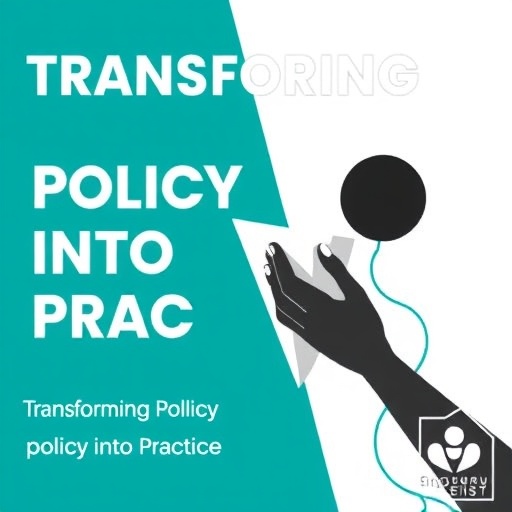
The ongoing quest for gender equality and improved health standards in society has led to innovative approaches in addressing menstrual health management. One significant initiative comes from the Indian state of Odisha, where a groundbreaking school-based sanitary napkin distribution program has been implemented. This endeavor, highlighted in recent research by Desaraju, Panda, and Panigrahy, presents a model for how policy can translate into actionable practices that positively impact the lives of young women and girls.
In the heart of Odisha, a region often marred by socio-economic challenges, the implementation of this program was seen as a crucial step towards combating the stigma surrounding menstruation. Traditionally, menstruation has been cloaked in taboo, leading to inadequate education about menstrual health, poor hygiene practices, and a notable dropout rate among girls from schools during their menstrual cycles. By introducing a systematic approach to provide sanitary napkins in schools, the program aims not only to enhance the health and hygiene of students but also to promote their educational continuity.
The findings of this program, as reported by the researchers, shed light on the tremendous potential of implementing health policies at the grassroots level. The research indicates that accessibility to sanitary products significantly influences school attendance among adolescent girls. Prior to the program’s launch, many young girls were either forced to miss school or employ unsafe alternatives such as cloth or leaves during their menstrual cycle. The distribution of sanitary napkins helped remove these barriers, allowing girls to participate fully in their education without fear of embarrassment or health risks.
Moreover, the program integrates educational components that empower girls with knowledge about their bodies and menstrual health. Workshops and seminars are organized alongside the distribution of sanitary napkins to facilitate discussions about menstruation, hygiene practices, and reproductive health. This holistic approach not only normalizes the conversation around menstruation but also fosters a supportive community where girls feel comfortable sharing their concerns and experiences.
Equally important is the involvement of teachers and school authorities in this initiative. Training sessions for educators have been established to equip them with the knowledge and tools to support their students better. By engaging teachers, the program reinforces the message that menstrual health is a vital aspect of a girl’s overall well-being. Educators play a pivotal role in shaping positive attitudes towards menstruation, thereby changing the social narrative that has historically marginalized this topic.
The program has also attracted interest from local communities, and its success has sparked conversations about menstrual health management beyond the realm of education. Community leaders and parents are recognizing the need for broader awareness and advocacy concerning menstrual hygiene. As these discussions unfold, the program stands as a catalyst for social change, urging communities to move towards a more supportive environment for discussing and addressing menstrual health issues.
However, the successful implementation of sanitary napkin distribution programs requires addressing underlying challenges. Distribution logistics, product sustainability, and ongoing financial support are all critical components that need careful consideration. The research highlights the necessity for partnerships with local manufacturers to ensure a consistent supply of quality sanitary products. These partnerships not only secure the availability of materials but can also spur local economic development, creating jobs and fostering entrepreneurship in the community.
Furthermore, sustaining such a program calls for ongoing advocacy efforts to maintain stakeholder engagement. The researchers emphasize that local government and educational institutions must collaborate to uphold the initiative and ensure its scalability to other regions. The study notes that government support is essential for policy amendments that recognize the importance of menstrual health as part of public health agendas.
Evaluating the program’s impact is crucial to refining and expanding its effectiveness. Metrics such as school attendance rates, the frequency of sanitary product usage, and shifts in community attitudes towards menstruation are pivotal indicators of success. As data becomes available, continuous assessments can lead to improved practices, benefitting not only Odisha but potentially providing a model for national replication throughout India and beyond.
As the world increasingly acknowledges the importance of women’s health, policies like the school-based sanitary napkin distribution program offer fresh insight into how to address long-standing health disparities effectively. By tackling menstrual health issues head-on, we not only improve the lives of individual girls but also contribute to the overarching goal of gender equality. Through education, engagement, and community support, initiatives like those proposed and studied in Odisha have the power to transform lives and reshape societal norms around menstruation for generations to come.
In conclusion, the sanitary napkin distribution initiative in Odisha serves as a testament to the impact of thoughtfully designed public health policies. Research conducted by Desaraju et al. brings to light the multifaceted benefits of addressing menstrual health through education and community involvement. As the program continues to evolve, it holds the promise of not only enhancing the health and educational outcomes of countless girls but also fostering an environment where menstrual health is recognized and normalized. This could pave the way for future interventions aimed at achieving comprehensive health and educational reforms across diverse cultural landscapes.
Subject of Research: Menstrual health management through school-based sanitary napkin distribution.
Article Title: Policy to practice: insights from implementation of a school-based sanitary napkin distribution programme in Odisha, India.
Article References:
Desaraju, S., Panda, N., Panigrahy, R.P. et al. Policy to practice: insights from implementation of a school-based sanitary napkin distribution programme in Odisha, India.
Health Res Policy Sys 23, 94 (2025). https://doi.org/10.1186/s12961-025-01316-w
Image Credits: AI Generated
DOI: 10.1186/s12961-025-01316-w
Keywords: Menstrual health, sanitary napkin distribution, school programs, public health policy, gender equality.
Tags: addressing menstruation tabooscombating menstrual stigmaeducational continuity for girlsenhancing health standards for studentsgender equality initiatives in Indiagrassroots health initiativesimproving hygiene practices for girlsmenstrual health management in Odishapolicy implementation in educationresearch on menstrual health impactsanitary napkin distribution programschool-based health programs




